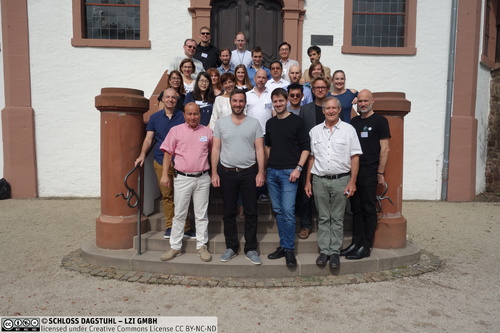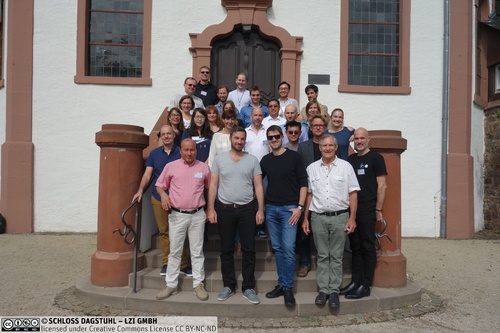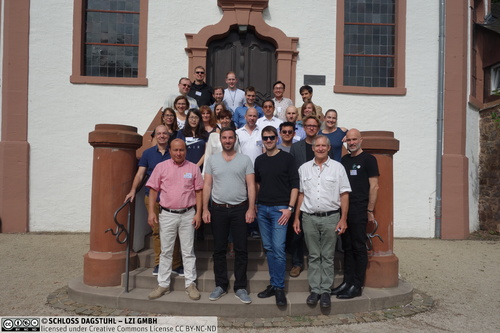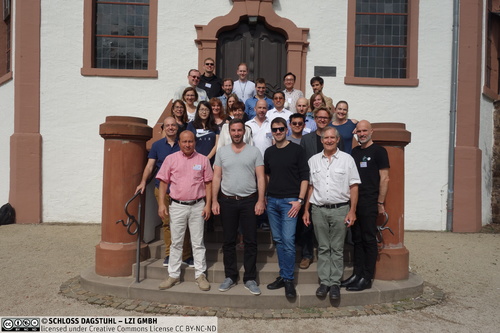Dagstuhl Seminar 18332
Blockchain Technology for Collaborative Information Systems
( Aug 12 – Aug 17, 2018 )
Permalink
Organizers
- Marlon Dumas (University of Tartu, EE)
- Richard Hull (IBM TJ Watson Research Center - Yorktown Heights, US)
- Jan Mendling (Wirtschaftsuniversität Wien, AT)
- Ingo Weber (Data61, CSIRO - Sydney, AU)
Contact
- Andreas Dolzmann (for scientific matters)
- Jutka Gasiorowski (for administrative matters)
Impacts
- Blockchain Support for Collaborative Business Processes : article : pp. 182-190 - Ciccio, Claudio Di; Cecconi, Alessio; Dumas, Marlon; Lopez-Pintado, Orlenys; Tran, An Binh; Weber, Ingo M.; Ponomarev, Alexander; Mendling, Jan; Lu, Qinghua; Garcia-Banuelos, Luciano - Berlin : Springer, 2019 - (Informatik Spektrum ; 42. 2019, 3).
- Caterpillar : A business process execution engine on the Ethereum blockchain : article - Lopez-Pintado, Orlenys; Garcia-Banuelos, Luciano; Dumas, Marlon; Weber, Ingo M.; Ponomarev, Alexander - Chichester : Wiley, 2019 - (Software ; 49. 2019 : pp. 1162-1193).
- Dynamic Role Binding in Blockchain-Based Collaborative Business Processes : article in CAiSE 2019 : Advanced Information Systems Engineering - Lopez-Pintado, Orlenys; Dumas, Marlon; Garcia-Banuelos, Luciano; Weber, Ingo M. - Berlin : Springer, 2019. - pp. 399-414 - (Lecture notes in computer science ; 11483 : article).
- Extracting Event Logs for Process Mining from Data Stored on the Blockchain : article in BPM 2019 Workshops - Mühlberger, Roman; Bachhofner, Stefan; Ciccio, Claudio Di; Garcia-Banuelos, Luciano; Lopez-Pintado, Orlenys - Berlin : Springer, 2019. - pp. 690-703 - (Lecture notes in business information processing ; 362 : article).
- Extracting Event Logs for Process Mining from Data Stored on the Blockchain : preprint : article in Second Workshop on Security and Privacy-enhanced Business Process Management (SPBP), BPM Workshops, September 2nd, 2019, Vienna, Austria 2019 - Mühlberger, Roman; Bachhofner, Stefan; Ciccio, Claudio Di; Garcia-Banuelos, Luciano; Lopez-Pintado, Orlenys - 2019. - 13 pp..
- Interpreted Execution of Business Process Models on Blockchain : article - Lopez-Pintado, Orlenys; Dumas, Marlon; Garcia-Banuelos, Luciano; Weber, Ingo M. - Cornell University : arXiv.org, 2019. - 10 pp..
- Interpreted Execution of Business Process Models on Blockchain : article in 2019 IEEE 23rd International Enterprise Distributed Object Computing Conference (EDOC) - Lopez-Pintado, Orlenys; Dumas, Marlon; Garcia-Banuelos, Luciano; Weber, Ingo M. - Los Alamitos : IEEE, 2019. - pp. 206-215.
The emergence of blockchain technology has opened manifold opportunities to redesign business-to-business collaborations in a wide range of fields, including healthcare, supply chain, logistics, and Industry 4.0. Traditionally, business collaborations are executed by relying on trusted third-party providers such as Electronic Data Interchange (EDI) hubs or escrows. This centralized architecture creates entry barriers and hinders process innovation. Blockchains and smart contracts enable these processes to be executed in a distributed manner without delegating trust to central authorities nor requiring mutual trust between each pair of parties. Furthermore, blockchain technology potentially enables fine-grained access controls, allowing different parties to selectively share different data with different partners, even though all the data is resident in the blockchain.
While blockchain opens up new possibilities, it also raises a number of challenges because it requires us to re-think the way business collaborations are designed and implemented. In contrast to centralized collaborations, the transparent and decentralized nature of blockchains brings in new challenges related to compliance, control, and privacy, in addition to major scalability and performance challenges.
This Dagstuhl Seminar will bring together established and young researchers with forward-thinking industry representatives from both large and start-up companies, in order to establish a research roadmap for blockchain-based collaborative information systems, and to initiate concrete collaborations between participants along this roadmap. The seminar will address the following overarching questions:
- How will existing collaborative information systems be transformed by blockchain technology?
- What are the research challenges that need to be addressed to enable these transformations?
Specific research themes to be discussed during the the seminar include:
- Modeling paradigms for blockchain-based information systems
- User-friendly specification and monitoring of smart contracts
- Synthesis of smart contracts from high-level specifications of business collaborations
- Verification and validation of blockchain-based collaborative information systems
- Enforcing regulations and business rules with smart contracts
- Collaborative business process optimization on blockchain
- Privacy models for blockchain-based collaborative information systems
- Security requirements engineering for blockchain-based collaborative information systems
- Linking blockchain platform properties with business and compliance goals
- Novel business collaboration models enabled by blockchain
- Blockchain and ethical business practices
- Vertical applications of blockchain-based collaborative information systems (e.g. healthcare, supply chain)
The audience of the seminar will be largely interdisciplinary. It will combine academic and industrial researchers in security and privacy, blockchain technology, software engineering, databases, distributed systems, information systems engineering, business process management, supply chain management, and logistics.
The format of the seminar will combine short introductory presentations by the participants, tutorials and visionary talks, and workgroup discussions focused on specific research themes.
 Marlon Dumas, Richard Hull, Jan Mendling, and Ingo Weber
Marlon Dumas, Richard Hull, Jan Mendling, and Ingo Weber
Blockchain technology enables an evolving set of parties to maintain a safe, permanent, and tamper-proof ledger of transactions without a central authority. This technology opens manifold opportunities to redesign Business-to-Business (B2B) collaborations in a wide range of fields, including supply chain, logistics, service agreements, healthcare, and Industry 4.0. Importantly, it can enable substantial efficiency gains in terms of cost and time it takes to set-up and perform collaborative processes, particularly in settings where there is a lack of trust between the parties involved in the collaboration. Traditionally, collaborative processes are executed by relying on trusted third-party providers such as Electronic Data Interchange (EDI) hubs or escrows. This centralized architecture creates entry barriers and hinders bottom-up innovation. Blockchains and smart contracts enable these processes to be executed in a distributed manner without delegating trust to central authorities nor requiring mutual trust between each pair of parties. Further, blockchain enables fine-grained access control, thus allowing multiple parties to selectively share their data with each other and to selectively grant permissions to perform transactions on these data.
While blockchain opens up new possibilities, it also raises a number of challenges because it requires us to re-think the way B2B collaborations are designed and implemented. In contrast to centralized collaborative processes, the transparent and decentralized nature of blockchains brings in new challenges related to compliance, control, and privacy, in addition to major scalability and performance challenges. This seminar brought together established and young researchers with forward-thinking industry representatives from both large and start-up companies, in order to establish a research roadmap for blockchain-based collaborative information systems, and to initiate concrete research collaborations between participants along this roadmap.
 Marlon Dumas, Richard Hull, Jan Mendling, and Ingo Weber
Marlon Dumas, Richard Hull, Jan Mendling, and Ingo Weber
- Michael Coblenz (Carnegie Mellon University - Pittsburgh, US) [dblp]
- Soren Debois (IT University of Copenhagen, DK) [dblp]
- Claudio Di Ciccio (Wirtschaftsuniversität Wien, AT) [dblp]
- Alevtina Dubovitskaya (EPFL - Lausanne, CH) [dblp]
- Marlon Dumas (University of Tartu, EE) [dblp]
- Fabiana Fournier (IBM - Haifa, IL) [dblp]
- Avigdor Gal (Technion - Haifa, IL) [dblp]
- Luciano Garcia-Banuelos (University of Tartu, EE) [dblp]
- Stephan Haarmann (Hasso-Plattner-Institut - Potsdam, DE) [dblp]
- Richard Hull (IBM TJ Watson Research Center - Yorktown Heights, US) [dblp]
- Hans-Arno Jacobsen (TU München, DE) [dblp]
- Mieke Jans (Hasselt University, BE) [dblp]
- Agnes Koschmider (KIT - Karlsruher Institut für Technologie, DE) [dblp]
- Qinghua Lu (Data61, CSIRO - Sydney, AU) [dblp]
- Raimundas Matulevicius (University of Tartu, EE) [dblp]
- Jan Mendling (Wirtschaftsuniversität Wien, AT) [dblp]
- Petr Novotny (IBM TJ Watson Research Center - Yorktown Heights, US) [dblp]
- Sooyong Park (Sogang University - Seoul, KR) [dblp]
- Stefanie Rinderle-Ma (Universität Wien, AT) [dblp]
- Stefan Schulte (TU Wien, AT) [dblp]
- Jérome Siméon (Clause - New York, US) [dblp]
- Ludwig Stage (Tübingen, DE) [dblp]
- Mark Staples (Data61, CSIRO - Eveleigh, AU) [dblp]
- Barbara Weber (Universität Innsbruck, AT) [dblp]
- Ingo Weber (Data61, CSIRO - Sydney, AU) [dblp]
- Francesca Zerbato (University of Verona, IT) [dblp]
- Kaiwen Zhang (ETS - Montreal, CA) [dblp]
Classification
- modelling / simulation
- networks
- semantics / formal methods
Keywords
- blockchain
- business process modeling
- information processing systems





 Creative Commons BY 3.0 DE
Creative Commons BY 3.0 DE
